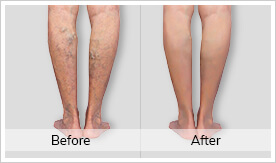At Advanced Midwest Interventional Radiology, we offer world class clinical evaluation, imaging, and minimally invasive therapies for a wide variety of conditions including venous disease, arterial disease, cancer, and more. Our comprehensive and focused approach ensures that each of our patients gets the best possible outcome. To learn about our services, click on one of the tabs below:
Varicose veins are enlarged veins with diseased valves that flow in the wrong direction or “reflux”. They can appear as discolored, twisted blood vessels near the skin on the thighs and calves, but are sometimes invisible. Along with cosmetic problems of the abnormal bulging veins, varicose veins can lead to swelling, pain, skin color changes, dermatitis, and ulcers which are worse with prolonged standing or walking. Varicose veins can also be associated with more serious deep vein problems. The doctors at AMIR can evaluate your veins and treat both superficial and deep vein problems.
Read More- May-Thurner’s Syndrome and other causes of deep venous insufficiency
- Deep Venous Thrombosis (DVT) and Pulmonary Embolism (PE)
- IVC Filter Placement and Retrieval
- SVC Syndrome
- Paget-Schroetter Syndrome
- Nutcracker Syndrome
- Budd-Chiari Syndrome
- Peripheral Arterial Disease
- Upper Limb (Arm) Artery Disease
- Chronic Mesenteric Ischemia
- Renal Artery Stenosis
- Y-90 Radioembolization
- Other Tumor Embolization
- Liver Tumor Ablation
- Renal Tumor Ablation
- Lung Tumor Ablation
- Bone Tumor Ablation
- Biopsies
- Ports and Catheters
The uterus, also called the womb, is a female reproductive organ where a baby grows during pregnancy. Fibroids refer to noncancerous growths that can develop in the tissues of the uterus. This is a common health condition affecting women in the reproductive ages between 16 to 50 years.
Read MorePelvic Congestion Syndrome (PCS), also known as pelvic venous insufficiency, is one of the causes of chronic pelvic pain in women. PCS is characterised by worsening pelvic pain on sitting or standing for a long time but is relieved on lying flat. The pain can also be worse following urination or menstrual periods or intercourse.
Read MoreBenign prostatic hyperplasia (BPH) is the enlargement of the prostate gland. The word "benign" means the cells are not cancerous. "Hyperplasia" means an increased number of cells. The prostate gland usually enlarges with age but doesn't always cause problems.
Read MoreVaricoceles are abnormal enlargements of the veins in the scrotum. It is commonly found in adolescent boys in puberty, and occurs mostly around the left testicle, but can also occur on both sides.
Read MoreA fracture of the spine is a break in the bone continuity of the spinal vertebrae or vertebral column. The spine extends from the neck to the lower back and consists of the vertebral bones which surround and protect the spinal cord.
Read MorePortal hypertension refers to the increase in the pressure within the portal vein, which carries blood from your digestive organs to your liver. It is commonly caused due to scarring of the liver, also called, liver cirrhosis. Other causes may include a blood clot (thrombus) which blocks the blood flow across the liver.
Read MoreAt AMIR, we perform advanced interventions to preserve the dialysis access circuit. We use minimally invasive techniques to open blockages and narrowings related to arteriovenous (AV) grafts and fistulas. We are also developing a program to create new AV fistulas through minimally invasive techniques to avoid the use of surgery. We also place and maintain hemodialysis catheters.
Read MoreIf you wish to be advised on the most appropriate treatment, please call or request an appointment online.






